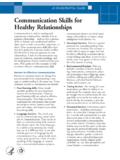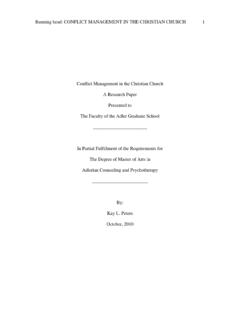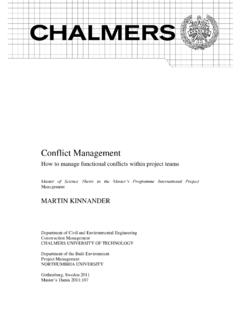Transcription of Conflict Resolution - wfm.noaa.gov
1 A WorkLife4 You GuideConflict is a normal, natural part of human relationships. People will not agree about everything all the time. In and of itself, con- flict is not necessarily a negative thing. When handled constructively it can help people to stand up for themselves and others, and work together to achieve a mutually satisfactory solution. But if Conflict is handled poorly it can cause anger, hurt, divisiveness and more serious problems. This guide discusses how to deal with Conflict in a constructive of ConflictThere can be many causes or reasons for con- flict . However, some of the most common include: Personal differences such as values, eth-ics, personalities, age, education, gender, social and economic status, cultural back-ground, temperament, health, religion, political beliefs, etc.
2 A clash of ideas, choices, or actions. For instance, Conflict can occur when people have incompatible goals, when they are in direct competition, or even when they have different work styles. Finally, poor communication or mis-communication is one of the biggest causes of Conflict . Preventing ConflictWhile it isn t possible to prevent all Conflict , there are steps that you can take to try to keep Conflict to a minimum. One way to manage Conflict is to prevent it from occurring in the first place. Preventing Conflict is not the same as avoiding Conflict . Preventing Conflict means behaving and communicating in a way that averts needless conflicts .
3 Conflict ResolutionConsider the following tips: Respect differences. Many conflicts arise from differences in gender, genera-tions, cultures, values, etc. We live in an increasingly diverse world. Learn to respect and celebrate peoples differ-ences and their opinions. Treat others as you d like to be treat-ed. Regardless of your personal opinion of someone, be professional, courteous, respectful, and tolerant, even when you re frustrated. If a person treats you disrespectfully, calmly tell them you do not appreciate it. Do not exacerbate the situation by retaliating with inappropri-ate behavior or comments.
4 Keep negative opinions to your-self Most people are put off by hearing negative comments about others espe-cially if it s about personal issue. In the workplace, this may lead to disciplin-ary action. Friends and acquaintances may be equally turned off by negative comments about someone, particularly if they feel they are being drawn into a Conflict or being asked to take sides. If you need to vent about a personal issue, do so outside of the workplace, keep it to a close, trusted friend or a loved one and keep it to a minimum. Keep your distance Unfortunately, this is often easier said than done.
5 Often the conflicts arise with those who are closest to us. It is often easier to get along if you respect one another s priva-cy and boundaries. Taking a break from each other can go along way in keeping the ConflictSometimes, Conflict cannot or should not be avoided. Knowing how to deal with Conflict is important for anyone. However, often people have not been given the tools to effectively deal with Conflict . Consider the following tips: Address the issue early. The longer you let an issue fester, the more time you waste and the greater chance you have of it spiraling into other problems.
6 Address the issue privately. Set up a time to talk in a private place, where you won t be overheard or interrupted. Speak to the person with whom you have the Conflict and try to resolve the issue one-on-one before involving others. Expect discomfort. You may have to say up front: Although this is uncom-fortable for me, if I don t address this, I m afraid we will not meet our goal. Be specific and objective. Identify the specific issue at hand and the effect it is having. Avoid generalizing statements such as always, ever or never. Stick to the subject; try not to digress into broad personality issues or revive past issues.
7 Focus on the outcome. Don t dwell on problems or blame. Keep the spotlight on finding solutions and how you will reach the desired outcomes. In order to reach the goal of X, I think we need to do Y. Be open. Doing so establishes an atmo-sphere of mutual respect and coop-eration. Listen to and consider others opinions, points of view and ideas. Understand and appreciate that they think differently than you and may bring a greater, or different, understand-ing to the table that will help resolve the problem more quickly and effectively. Respond constructively. Let the other person know you value what he or she is saying, even if you don t agree.
8 Try to avoid responding negatively or directively, for example criticizing, ridiculing, dis-missing, diverting (talking about your-self rather than about what the other person has said) or rejecting the other person or what they are saying. Know your triggers. Learn to recognize your personal warning signs for anger and figure out the ways that work for best for you to constructively control your anger. Maintain a sense of humor. Be will-ing to laugh, including at yourself. Maintaining a sense of humor can relieve stress and tension, and help get you and others through a difficult time.
9 Learn to compromise. Compromise is important in any relationship. If you disagree on an issue, discuss the prob-lem calmly, allow each person to explain his or her point of view, and look for ways to meet each other in the middle. Don t attempt to resolve Conflict when tempers are flaring. During an argument, often no one can agree on a reasonable solution. If that is the case, agree to take a break and come back to the problem later, when you have had time to settle down and think about the issue. Know when to retreat. The Conflict Resolution process will not always work. The level of the skills of some people may not be at the point where they can be full partners in this process.
10 For example, you may have a spouse who does not want to, or know how to, solve the problem. You may also have a Conflict with a co-worker, boss or higher-up who is known for irrational outbursts. You must take all these factors into consideration and know when it may be more appropriate for you to cut your losses and retreat. Practice forgiveness. There may be times when someone makes a mistake or says or does something hurtful whether intentionally or unintention-ally. While it s okay to be angry, it s also important to let go of the anger and move on. On a personal level, it is healthier to let go of negative emotions like stress and anger.










